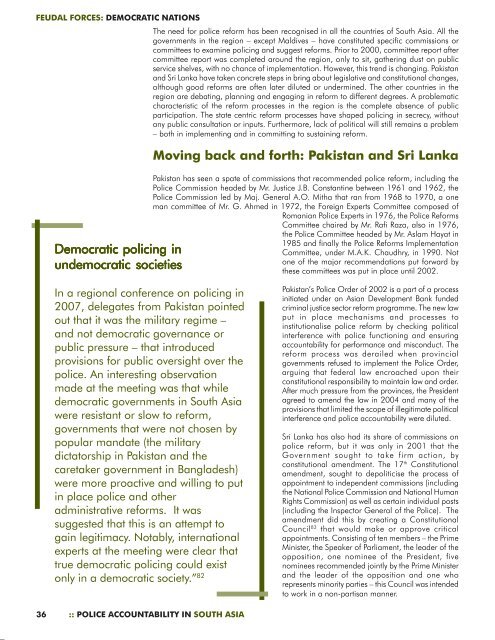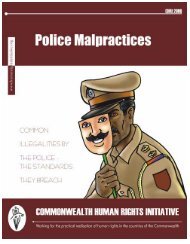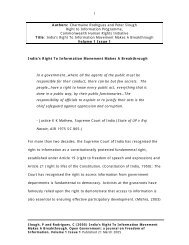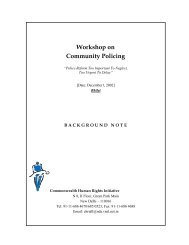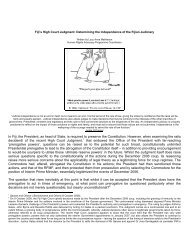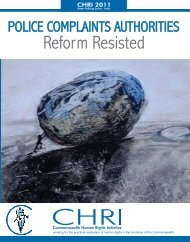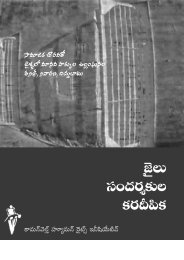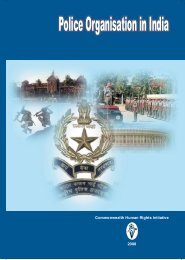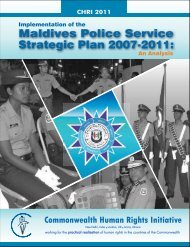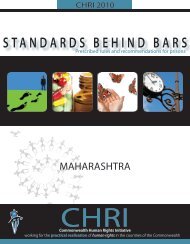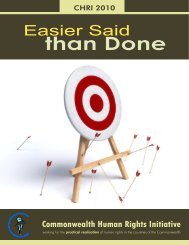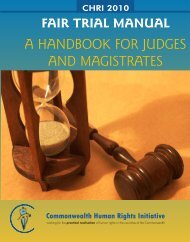Feudal Forces: Democratic Nations - Police Accountability in
Feudal Forces: Democratic Nations - Police Accountability in
Feudal Forces: Democratic Nations - Police Accountability in
Create successful ePaper yourself
Turn your PDF publications into a flip-book with our unique Google optimized e-Paper software.
FEUDAL FORCES: DEMOCRATIC NATIONS<strong>Democratic</strong> polic<strong>in</strong>g <strong>in</strong>undemocratic societiesThe need for police reform has been recognised <strong>in</strong> all the countries of South Asia. All thegovernments <strong>in</strong> the region – except Maldives – have constituted specific commissions orcommittees to exam<strong>in</strong>e polic<strong>in</strong>g and suggest reforms. Prior to 2000, committee report aftercommittee report was completed around the region, only to sit, gather<strong>in</strong>g dust on publicservice shelves, with no chance of implementation. However, this trend is chang<strong>in</strong>g. Pakistanand Sri Lanka have taken concrete steps <strong>in</strong> br<strong>in</strong>g about legislative and constitutional changes,although good reforms are often later diluted or underm<strong>in</strong>ed. The other countries <strong>in</strong> theregion are debat<strong>in</strong>g, plann<strong>in</strong>g and engag<strong>in</strong>g <strong>in</strong> reform to different degrees. A problematiccharacteristic of the reform processes <strong>in</strong> the region is the complete absence of publicparticipation. The state centric reform processes have shaped polic<strong>in</strong>g <strong>in</strong> secrecy, withoutany public consultation or <strong>in</strong>puts. Furthermore, lack of political will still rema<strong>in</strong>s a problem– both <strong>in</strong> implement<strong>in</strong>g and <strong>in</strong> committ<strong>in</strong>g to susta<strong>in</strong><strong>in</strong>g reform.Mov<strong>in</strong>g back and forth: Pakistan and Sri LankaPakistan has seen a spate of commissions that recommended police reform, <strong>in</strong>clud<strong>in</strong>g the<strong>Police</strong> Commission headed by Mr. Justice J.B. Constant<strong>in</strong>e between 1961 and 1962, the<strong>Police</strong> Commission led by Maj. General A.O. Mitha that ran from 1968 to 1970, a oneman committee of Mr. G. Ahmed <strong>in</strong> 1972, the Foreign Experts Committee composed ofRomanian <strong>Police</strong> Experts <strong>in</strong> 1976, the <strong>Police</strong> ReformsCommittee chaired by Mr. Rafi Raza, also <strong>in</strong> 1976,the <strong>Police</strong> Committee headed by Mr. Aslam Hayat <strong>in</strong>1985 and f<strong>in</strong>ally the <strong>Police</strong> Reforms ImplementationCommittee, under M.A.K. Chaudhry, <strong>in</strong> 1990. Notone of the major recommendations put forward bythese committees was put <strong>in</strong> place until 2002.In a regional conference on polic<strong>in</strong>g <strong>in</strong>2007, delegates from Pakistan po<strong>in</strong>tedout that it was the military regime –and not democratic governance orpublic pressure – that <strong>in</strong>troducedprovisions for public oversight over thepolice. An <strong>in</strong>terest<strong>in</strong>g observationmade at the meet<strong>in</strong>g was that whiledemocratic governments <strong>in</strong> South Asiawere resistant or slow to reform,governments that were not chosen bypopular mandate (the militarydictatorship <strong>in</strong> Pakistan and thecaretaker government <strong>in</strong> Bangladesh)were more proactive and will<strong>in</strong>g to put<strong>in</strong> place police and otheradm<strong>in</strong>istrative reforms. It wassuggested that this is an attempt toga<strong>in</strong> legitimacy. Notably, <strong>in</strong>ternationalexperts at the meet<strong>in</strong>g were clear thattrue democratic polic<strong>in</strong>g could existonly <strong>in</strong> a democratic society.” 82Pakistan’s <strong>Police</strong> Order of 2002 is a part of a process<strong>in</strong>itiated under an Asian Development Bank fundedcrim<strong>in</strong>al justice sector reform programme. The new lawput <strong>in</strong> place mechanisms and processes to<strong>in</strong>stitutionalise police reform by check<strong>in</strong>g political<strong>in</strong>terference with police function<strong>in</strong>g and ensur<strong>in</strong>gaccountability for performance and misconduct. Thereform process was derailed when prov<strong>in</strong>cialgovernments refused to implement the <strong>Police</strong> Order,argu<strong>in</strong>g that federal law encroached upon theirconstitutional responsibility to ma<strong>in</strong>ta<strong>in</strong> law and order.After much pressure from the prov<strong>in</strong>ces, the Presidentagreed to amend the law <strong>in</strong> 2004 and many of theprovisions that limited the scope of illegitimate political<strong>in</strong>terference and police accountability were diluted.Sri Lanka has also had its share of commissions onpolice reform, but it was only <strong>in</strong> 2001 that theGovernment sought to take firm action, byconstitutional amendment. The 17 th Constitutionalamendment, sought to depoliticise the process ofappo<strong>in</strong>tment to <strong>in</strong>dependent commissions (<strong>in</strong>clud<strong>in</strong>gthe National <strong>Police</strong> Commission and National HumanRights Commission) as well as certa<strong>in</strong> <strong>in</strong>dividual posts(<strong>in</strong>clud<strong>in</strong>g the Inspector General of the <strong>Police</strong>). Theamendment did this by creat<strong>in</strong>g a ConstitutionalCouncil 83 that would make or approve criticalappo<strong>in</strong>tments. Consist<strong>in</strong>g of ten members – the PrimeM<strong>in</strong>ister, the Speaker of Parliament, the leader of theopposition, one nom<strong>in</strong>ee of the President, fivenom<strong>in</strong>ees recommended jo<strong>in</strong>tly by the Prime M<strong>in</strong>isterand the leader of the opposition and one whorepresents m<strong>in</strong>ority parties – this Council was <strong>in</strong>tendedto work <strong>in</strong> a non-partisan manner.36 :: POLICE ACCOUNTABILITY IN SOUTH ASIA


